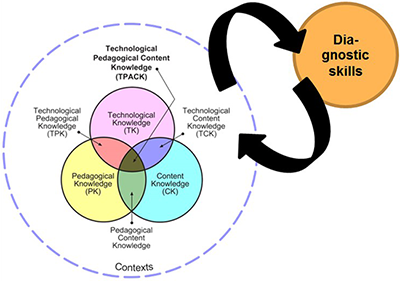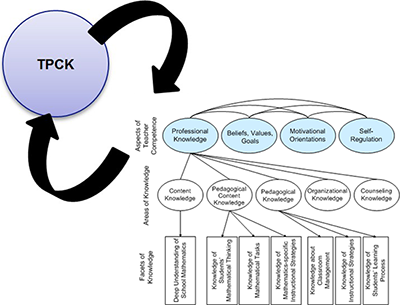Abstract
How can teachers make effective use of digital technologies in their teaching? How can they use digital tools to enhance student learning? What do they need to know to be able to do so? And, what can research tell us about how to answer these questions in order to help teachers acquire the necessary professional knowledge and to develop the necessary professional skills?
In order to approach such questions, the Technological Pedagogical Content Knowledge - model (TPACK, e.g., Angeli & Valanides, 2009; Mishra & Koehler, 2006) has become a widely acknowledged framework within the international community of researchers and teacher trainers. It elaborates on Shulman’s (1986, 1987) notion of Pedagogical Content Knowledge, claiming that technology-related aspects of teaching need to be understood as an integral part of a teacher’s professionally specific knowledge. Research and practice have provided ample evidence for the model’s general benefits (e.g., Koehler, Mishra, & Yahya, 2007; Kramarski & Michalsky, 2010). However, developing a more specific theoretical understanding of TPACK, especially with regard to the cognitive processes involved in its development, can give still further leverage to the potential of the framework.
The present workshop aims at initiating a discussion between two strands of research on teacher's professional knowledge and skills which both relate to Shulman's works: The TPACK model, and generic models of teacher competencies that have emerged from more culture-specific research in Germany (e.g., Bromme, 1992; 1997; Krauss et al., et al., 2008; Kunter et al., 2007). The goals are 1) to develop a common understanding of the TPACK framework in light of different theoretical constructs (see Figure 1) and methodological approaches and 2) to discuss how to establish an orchestrated research agenda that can generally improve teacher training for technology integration. The workshop will facilitate discussions in small groups, based on the theoretical input of the participants. We will reflect upon and rework the initial models throughout the workshop, also considering practical approaches. A joint publication is planned to be based on the contributions by the participants and the results of the discussions.
We combine the views on digital video technology as a tool in the hands of the teacher (Krauskopf, et al., 2010, Zahn, et al., 2010) and in the hands of the teacher educator. We address certain aspects not explicitly addressed by TPACK, namely the diagnostic competence of teachers (Goeze, Zottmann, Schrader, & Fischer, 2010) to analyze classroom situations and their own activities on a theoretical basis (digital video as tool in training a specific competence, video case-based learning). We also tackle the question of how experiencing digital video technology in their own learning implicitly helps teachers to develop their knowledge and intention to use technology in a similar fashion to teach their future students.
Figure 1: The TPACK framework in the light of
generic theoretical approaches on teacher competencies
emerging from research in Germany.


